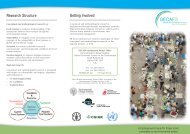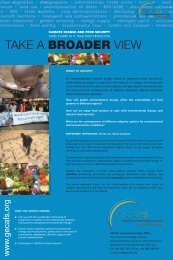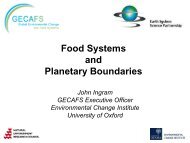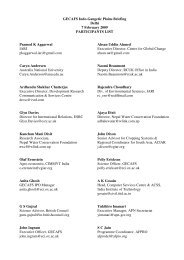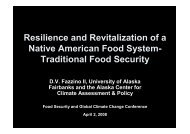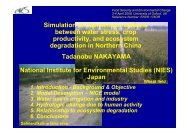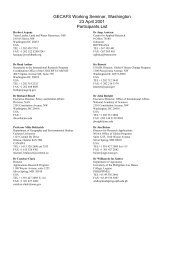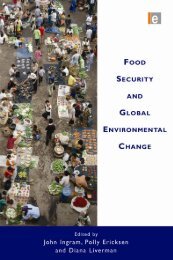From Food Production to Food Security - Global Environmental ...
From Food Production to Food Security - Global Environmental ...
From Food Production to Food Security - Global Environmental ...
- No tags were found...
You also want an ePaper? Increase the reach of your titles
YUMPU automatically turns print PDFs into web optimized ePapers that Google loves.
interactions between both spheres; (ii) exhibit a high degree of complexity of interactions;(iii) span multiple scales and levels; and (iv) have a large diversity of activities and ac<strong>to</strong>rs.Integrating concepts from production ecology, agroecology and human ecology withconcepts of food systems and scales leads <strong>to</strong> the concept of ‘food system ecology’.Developing food security research based on this ‘food system ecology’ helps identifypriorities for research investment. Two areas warrant particular attention: improving input useefficiency across the whole food system; and enhancing food system governance.Main attention for improving input use efficiency in food systems is targeted <strong>to</strong>wardsnitrogen-, water - and energy-use efficiency in the agricultural sec<strong>to</strong>r. Research oftenemploys production ecological approaches applied at crop, cropping systems, farmingsystems and land use levels. Other necessary research avenues involve better coupling ofplant and animal components in agricultural systems <strong>to</strong> optimise input use efficiency.However, the use of energy and water also needs <strong>to</strong> be optimised in transport and s<strong>to</strong>rage(especially in the cold chain); in food processing; in retail; and in consumption. However, themost pressing need is <strong>to</strong> reduce waste which occurs in all food system activities. Reducingwaste across the whole food system will increase the amount of food available for humanconsumption for the given level of inputs, thereby improving input use efficiency. This is alsoan imperative given the economic, environmental and ethical costs this waste represents.Further research is also needed on food system governance. This is a highly complex area due<strong>to</strong> the inherent cross-level and cross-scale nature of 21st Century food systems, involvingmultiple ac<strong>to</strong>rs and stakeholders. This is further complicated by their differing understandingof scales and levels, and a range of governance approaches. ‘Adaptive’ governance may wellbe better suited <strong>to</strong> these complex food systems than the ‘monocentric’ governance (which isthe dominating formal structure) as it accommodates the complex interactions between socialand ecological systems. More importantly, however, adaptive governance focuses on therange of scales and levels inherent in food systems and notes both the importance of, andproblems arising from, the cross-scale and cross-level interactions. Further governancequestions relate <strong>to</strong> the location and concentration of power and role of marketing in changingconsumer behaviour regarding diet and waste; and in relation <strong>to</strong> the growing environmentalagenda.The engagement of as wide a range of stakeholders as possible (e.g. researchers, policyagencies, civil society, the business community and donors) is needed in all stages of foodsecurity studies, although transaction costs can be high for all involved. The emergence inrecent decades of ‘boundary organisations’ that aim <strong>to</strong> help bridge between the scienceendeavour and policy and other stakeholder communities has helped considerably, andboundary organisations will continue <strong>to</strong> be a key component of food security research andpolicy formulation.A final point is that food security research requires an institutional setting conducive <strong>to</strong>engendering an interdisciplinary approach. A unified institutional research framework is143



